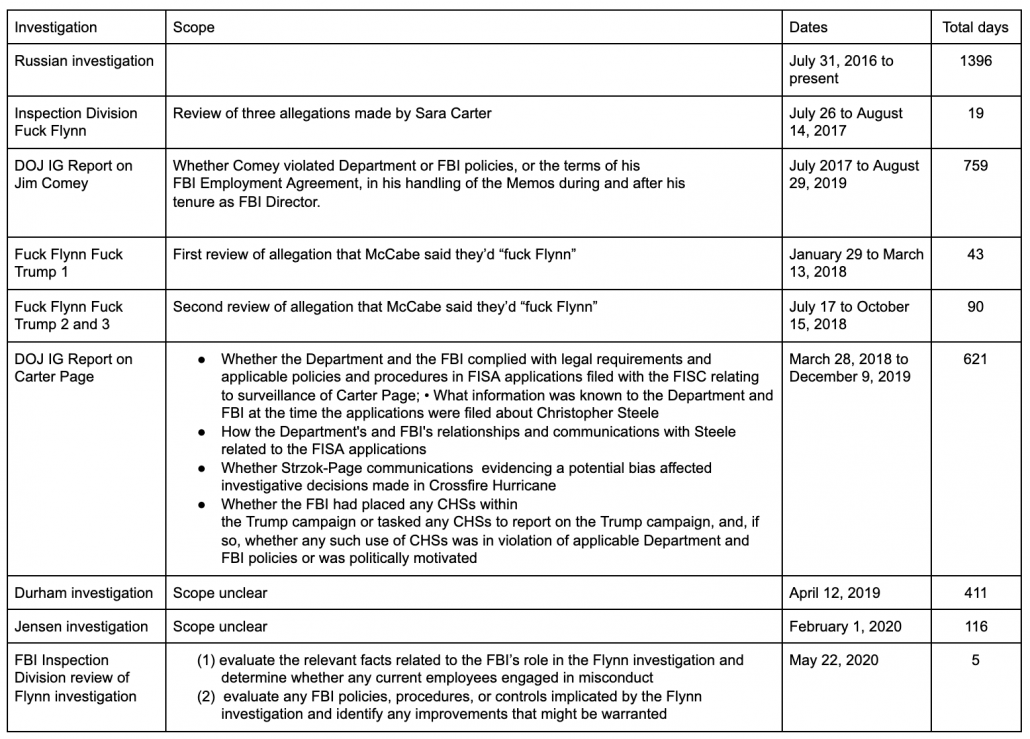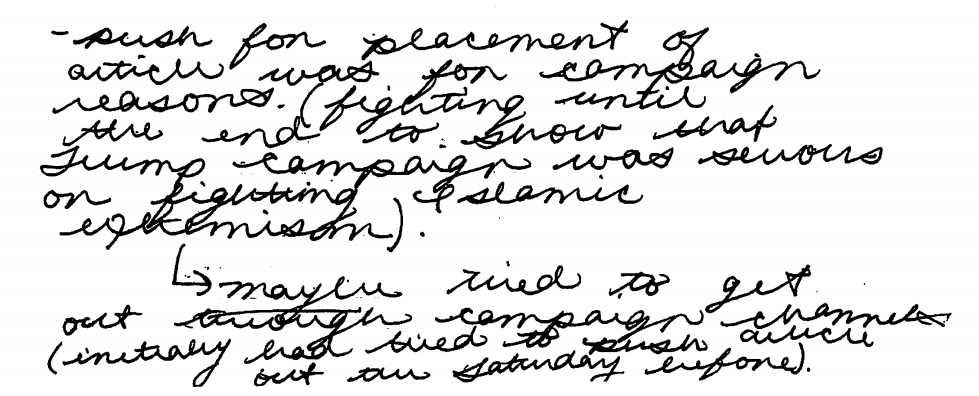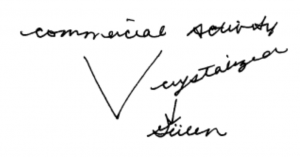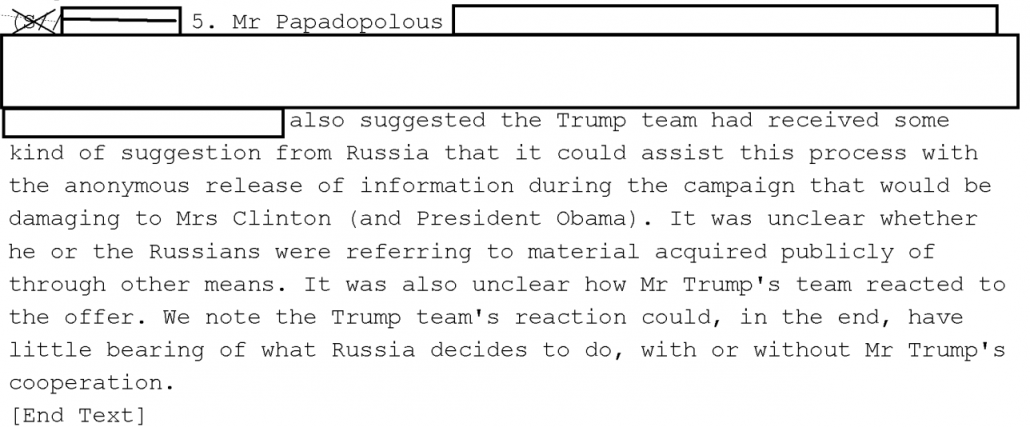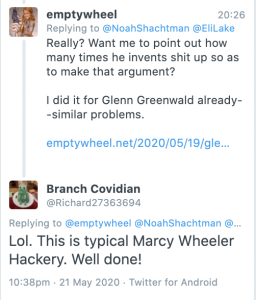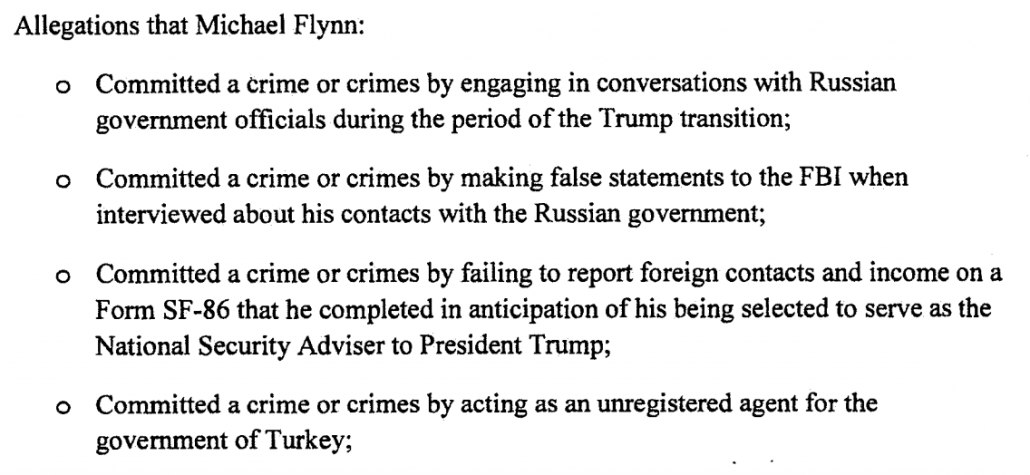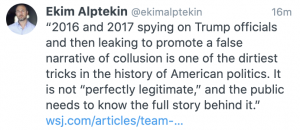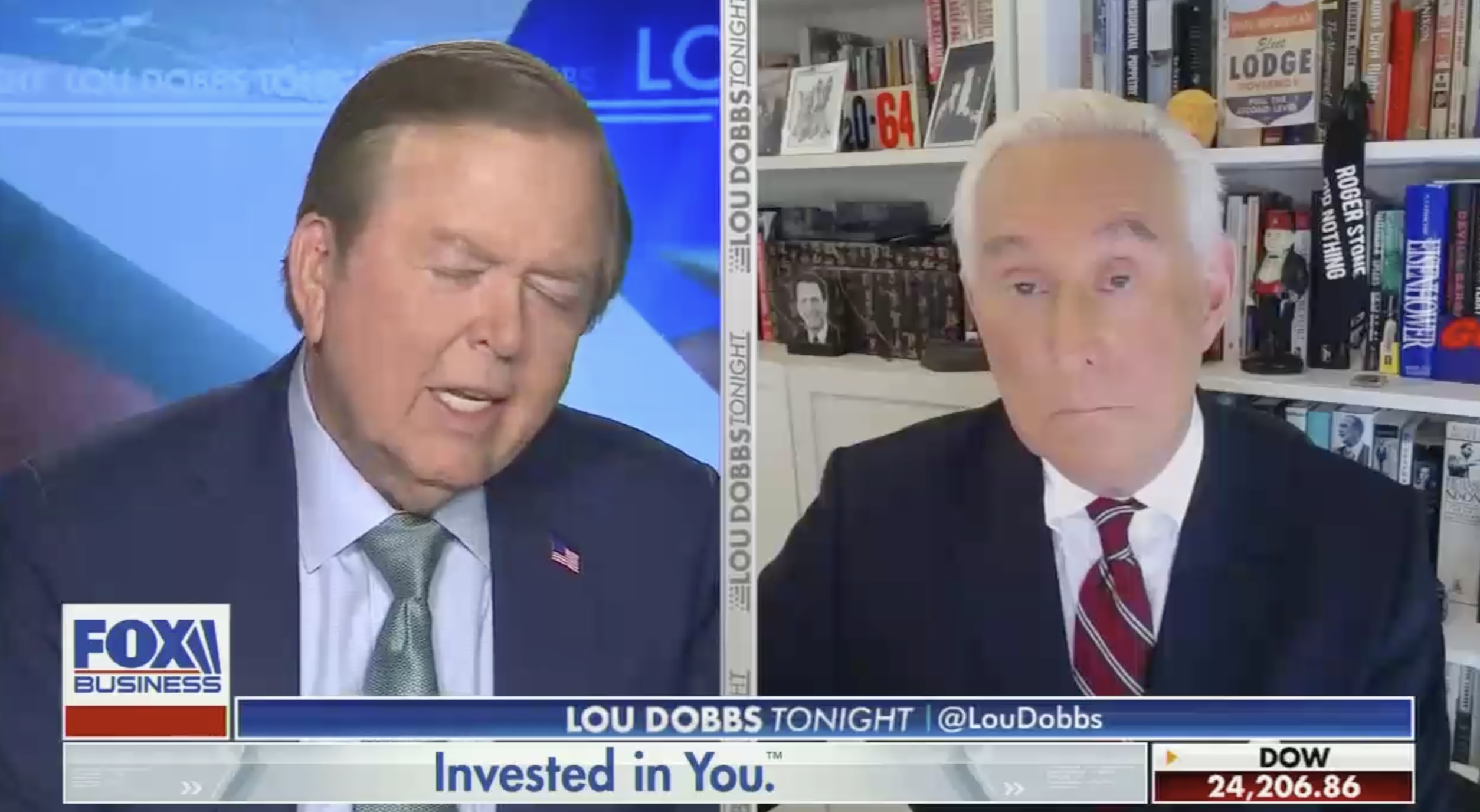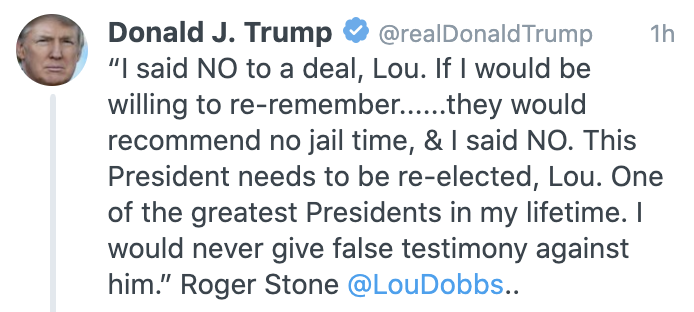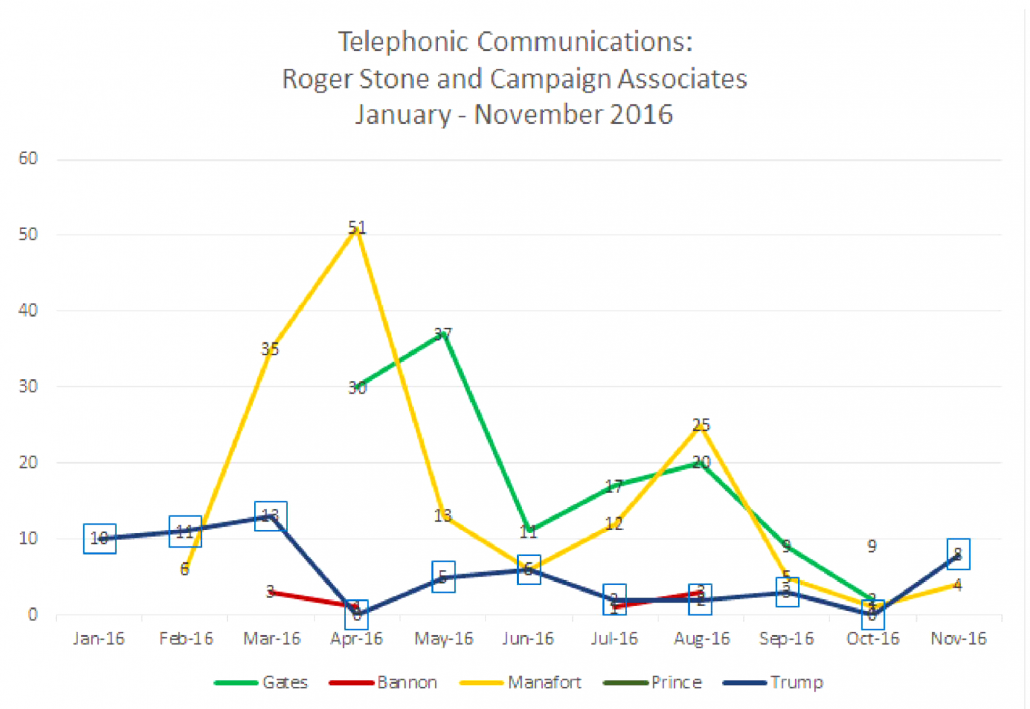On the Two ECs Opening the Investigation into Mike Flynn
A number of people have pointed me to this opinion piece, written by former top FBI guy, Kevin Brock, arguing that the Electronic Communication opening the Crossfire Hurricane investigation proves that the Trump campaign was investigated without justification. It bases that claim on several complaints:
- It doesn’t fit what Brock deems to be a normal EC because:
- It doesn’t have a “To” line
- Peter Strzok both opened and approved it
- It redacts the names of people who, Brock says, should be more senior than Strzok
- It opened (Brock says) as a FARA investigation, without explaining why subjects of the investigation are subjects
- Strzok justified the investigation by saying it served to determine if Trump’s people wittingly or unwittingly were working with Russia, without justifying a FARA investigation
From there, Brock claims that because there’s no articulation tying the evidence to those being investigated, the EC is proof the entire investigation was made up.
Ultimately, there was no attempt by Strzok to articulate any factors that address the elements of FARA. He couldn’t, because there are none. Instead, there was a weak attempt to allege some kind of cooperation with Russians by unknown individuals affiliated with the Trump campaign, again, with no supporting facts listed.
What this FBI document clearly establishes is that Crossfire Hurricane was an illicit, made-up investigation lacking a shred of justifying predication, sprung from the mind of someone who despised Donald Trump, and then blessed by inexperienced leadership at the highest levels who harbored their own now well-established biases.
The piece is more worthwhile than most pieces on the investigation. But there are several problems with it.
First, Brock doesn’t mention what is apparent when reading this document in context (but is not if you’re unfamiliar with the context and ignore the redactions). When you combine the document with what Bill Priestap says the Australian tip included, the document makes clear that George Papadopoulos specifically tied the campaign’s own plans to win the election by using dirt on Hillary Clinton to Russia’s offer to help in the process of using dirt on Hillary to win the election.
Papadopoulos said Trump would win because they had dirt on Hillary and then suggested Russia could “assist this process” — that is, using dirt to win the election — by anonymously releasing information damaging to Hillary.
The “this process” hidden behind the redaction is “using dirt to win the election.” The antecedent of “this process” must be (because that description does not and could not appear anywhere else), using dirt to win the election.
It is, perhaps, a subtle thing. But in context as the FBI received it, Papadopoulos tied Russia anonymously dropping dirt on Hillary to the centrality of dirt on Hillary in the Trump campaign’s plan to win.
Of course, to know that, you’d have to read the DOJ IG Report on Carter Page, which explains how the investigation got opened and specifically addresses some of the items that Brock raises. For example, the report cites multiple people putting the Australian tip in context with the ongoing investigation into the DNC hacks.
According to Priestap, he authorized opening the Crossfire Hurricane counterintelligence investigation on July 31, 2016, based upon these discussions. He told us that the FFG information was provided by a trusted source-the FFGand he therefore felt it “wise to open an investigation to look into” whether someone associated with the Trump campaign may have accepted the reported offer from the Russians. Priestap also told us that the combination of the FFG information and the FBI’s ongoing cyber intrusion investigation of the DNC hacks created a counterintelligence concern that the FBI was “obligated” to investigate.
The report also describes several people involved in the decision whose names remain redacted — the Intel Section Chief and the OGC Unit Chief — who might be the redacted names (as well as Bill Priestap).
It describes why Strzok, and not any case agent, opened the investigation.
After Priestap authorized the opening of Crossfire Hurricane, Strzok, with input from the OGC Unit Chief, drafted and approved the opening EC. 175 Strzok told us that the case agent normally drafts the opening EC for an investigation, but that Strzok did so for Crossfire Hurricane because a case agent was not yet assigned and there was an immediate need to travel to the European city to interview the FFG officials who had met with Papadopoulos.
It explains why the EC didn’t have a subject or subjects.
On July 31, 2016, the FBI opened a full counterintelligence investigation under the code name Crossfire Hurricane “to determine whether individual(s) associated with the Trump campaign are witting of and/or coordinating activities with the Government of Russia.” As the predicating information did not indicate a specific individual, the opening EC did not include a specific subject or subjects.
Finally, it explains how, with counterintelligence investigations, you might name crimes even when the investigation was into a national security threat.
Crossfire Hurricane was opened by CD and was assigned a case number used by the FBI for possible violations of the Foreign Agents Registration Act (FARA), 22 U.S.C. § 611, et seq., and 18 U.S.C. § 951 (Agents of Foreign Governments). 170 As described in Chapter Two, the AG Guidelines recognize that activities subject to investigation as “threats to the national security” may also involve violations or potential violations of federal criminal laws, or may serve important purposes outside the ambit of normal criminal investigation and prosecution by informing national security decisions. Given such potential overlap in subject matter, neither the AG Guidelines nor the DIOG require the FBI to differently label its activities as criminal investigations, national security investigations, or foreign intelligence collections.
Note, too, that DOJ IG, after reviewing all this, said the predication of the investigation fell within guidelines for Full Investigations. John Durham — Bill Barr’s designated investigator — did not, but he did say that the predication met the standards of a Preliminary Investigation (which would not have changed any available tools). So in making the argument about this redacted document, Brock is disagreeing not only with DOJ’s IG, but also with Barr’s designated investigator, both of whom have access to unredacted documents.
What’s stranger still is that this piece, dated May 27, doesn’t bother to discuss the opening EC for the Flynn investigation, which was made public on May 7. Consulting it shows, among other things, that DOJ releases documents to Judicial Watch with fewer redactions than they release in their own cases.
It shows that that EC, also, did not include a “To” line.
But it also shows how the individual EC did some of the things Brock claimed had not been done with regards to articulating the investigation, including describing why Flynn was investigated.
The FBI is opening a full investigation based on the articulable factual basis that reasonably indicates that CROSSFIRE RAZOR (CR) may wittingly or unwittingly be involved in activity on behalf of the Russian Federation which may constitute a federal crime or threat to the national security. The FBI is predicating the investigation on predetermined criteria set forth by the CROSSFIRE HURRICANE investigative team based on an assessment of reliable lead information received during the course of the investigation. Specifically, CR has been cited as an adviser to the Trump team on foreign policy issues February 2016; he has ties to various state-affiliated entities of the Russian Federation, as reported by open source information; and he traveled to Russia in December 2015, as reported by open source information. Additionally, CR has an active TS/SCI clearance.
The details describe how Flynn accepted multiple paid gigs with Russian quasi-state entities, including a junket to Moscow in December 2015 paid for by one of Russia’s propaganda outlets where he sat next to Vladimir Putin, then months later joined the Trump campaign, all while renewing his security clearance. The Crossfire Hurricane EC laid out the question: Whom would Russia have told they planned to help Trump win the election by dropping dirt on Hillary by providing their own dirt? And the hypothesis in the Crossfire Razor EC is that they might have told that to the guy Russia paid to meet Putin months before he joined the Trump campaign.
In addition, Flynn’s individual EC explains what the FARA designation on the original one, which Brock found so suspicious, means.
The goal of the investigation is to determine whether the captioned subject, associated with the Trump Team, is being directed and controlled by and/or coordinating activities with the Russian Federation in a manner which may be a threat to the national security and/or possibly a violation of the Foreign Agents Registration Act, 18 U.S.C section 951 et seq, or other related statutes.
That is, the goal wasn’t just busting Flynn in a FARA trap. It also — as virtually every Flynn defender likes to ignore — aimed to make sure he wasn’t secretly working for Russia (which is what it looks like when the incoming National Security Advisor calls up Russia and undermines the punishment imposed on Russia for tampering in the election and then lies about doing so to others in the Administration).
Most importantly, however, one of the goals was to see whether Russia was somehow controlling Flynn. It wasn’t (just) about Flynn. It was about potential harm to the US.
For some reason, Flynn’s defenders never want to talk about the damage it does to the United States when someone conducting an attack on the country gives one side advance notice of it.
There may still be reasons to question how the paperwork in this case was handled — though DOJ IG did not, in this specific case. And I find Brock’s questions more useful than the typical Flynn apology that directly contradicts the public record. But if you’re going to question the paperwork, at least consult all of the paperwork that has been made public.



